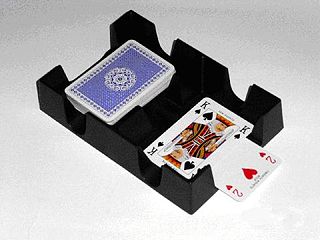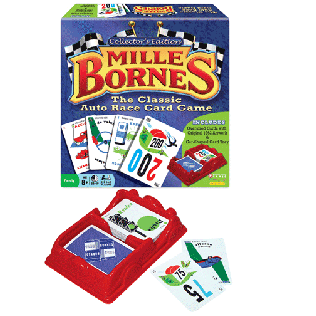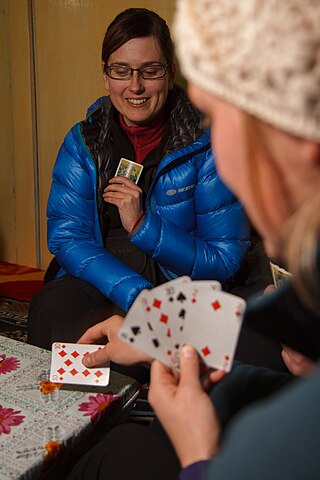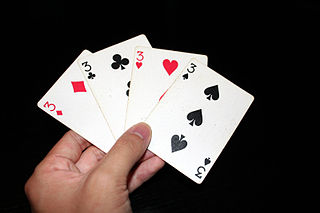Related Research Articles

Canasta is a card game of the rummy family of games believed to be a variant of 500 Rum. Although many variations exist for two, three, five or six players, it is most commonly played by four in two partnerships with two standard decks of cards. Players attempt to make melds of seven cards of the same rank and "go out" by playing all cards in their hands. It is "the most recent card game to have achieved worldwide status as a classic".

Mille Bornes is a French designer card game. Mille Bornes is listed in the GAMES Magazine Hall of Fame.

Shithead is a card game, the object of which is to lose all of one's playing cards, with the final player being the "shithead". The game became popular among backpackers in the late 20th century. Although the basic structure of the game generally remains constant, there are regional variations to the game's original rules.

President is a shedding card game for three or more, in which the players race to get rid of all of the cards in their hands in order to become "president" in the following round. It is a Westernized version of Chinese climbing card games such as Zheng Shangyou, and the Japanese Daifugō.
Ninety-nine is a card game for 2, 3, or 4 players. It is a trick-taking game that can use ordinary French-suited cards. Ninety-nine was created in 1967 by David Parlett; his goal was to have a good 3-player trick-taking game with simple rules yet great room for strategy.

500 rum, also called pinochle rummy, Michigan rummy, Persian rummy, rummy 500 or 500 rummy, is a popular variant of rummy. The game of canasta and several other games are believed to have developed from this popular form of rummy. The distinctive feature of 500 rum is that each player scores the value of the sets or cards they meld. It may be played by 2 to 8 players, but it is best for 3 to 5.
Spite and Malice, also known as Cat and Mouse or Screw Your Neighbor, is a traditional card game for two or more players. It is a reworking of the late 19th century Continental game Crapette and is a form of competitive solitaire, with a number of variations that can be played with two or three regular decks of cards. It is descended from Russian Bank.

Golf is a card game where players try to earn the lowest number of points over the course of nine deals.

Rummy is a group of matching-card games notable for similar gameplay based on matching cards of the same rank or sequence and same suit. The basic goal in any form of rummy is to build melds which can be either sets or runs and either be first to go out or to amass more points than the opposition.

Home repair involves the diagnosis and resolution of problems in a home, and is related to home maintenance to avoid such problems. Many types of repairs are "do it yourself" (DIY) projects, while others may be so complicated, time-consuming or risky as to require the assistance of a qualified handyperson, property manager, contractor/builder, or other professionals.

Desmoche is a popular rummy card game usually played for small stakes which closely resembles other games in the rummy family, like Conquian and gin rummy, more than poker. It was probably devised in Nicaragua in the first half of the 20th century.

Monopoly: The Card Game is loosely based on the board game Monopoly. The idea is to draw, trade and organize cards into "color-groups" along with bonus cards. Players take turns drawing and discarding cards until one completes a hand. The value of each player's hand is then counted and they receive the amount of Monopoly money they have earned. The first person to collect $10,000 wins.

Liverpool rummy is a multi-player, multi-round card game similar to other variants of rummy that adds features like buying and going out. It is played the same as Contract rummy, except that if a player manages to cut the exact number of cards required to deal the hand and leave a face-up card, then the cutting player's score is reduced by 50 points.

Contract rummy is a Rummy card game, based on gin rummy played by 3 to 8 players. It appeared in the United States during the Second World War. The game is also known as Combination rummy, Deuces Wild Rummy and Joker rummy, and a proprietary version of the game called Phase 10 was published in 1982.

A fitting or adapter is used in pipe systems to connect straight sections of pipe or tube, adapt to different sizes or shapes, and for other purposes such as regulating fluid flow. These fittings are used in plumbing to manipulate the conveyance of water, gas, or liquid waste in domestic or commercial environments, within a system of pipes or tubes.

Kalooki or Kaluki, is a version of Contract rummy popular in Jamaica, and it has become known as Jamaican Rummy. A version called "Super Kalooki" is played in tournaments, while a version called "Baby Kalooki" is often played with children or for purposes of teaching the game. There are a few variations of the game described in books and on the internet. A similar game is sometimes referred to as "Kalooki 40".
Buraco is a Rummy-type card game in the Canasta family for four players in fixed partnerships in which the aim is to lay down combinations in groups of cards of equal rank and suit sequences, there being a bonus for combinations of seven cards or more. Buraco is a variation of Canasta which allows both standard melds as well as sequences. It originated from Uruguay and Argentina in the mid-1940s, with apparent characteristics of simplicity and implications that are often unforeseeable and absolutely involving. Its name derives from the Portuguese word "buraco" which means “hole”, applied to the minus score of any of the two partnerships. The game is also popular in the Arab world, specifically in the Persian Gulf; where it is known as 'Baraziliya' (Brazilian). Another popular variation of Buraco is Italian.

RoboRally is a board game for 2–8 players designed by Richard Garfield and published by Wizards of the Coast (WotC) in 1994. Various expansions and revisions have been published by both WotC and by Avalon Hill.
Irish Switch, also called Two-four Jacks, Lives or Black Jack, is a version of the card game Switch popular in Ireland. It is very similar to the original with a few rule changes. Switch is a shedding-type card game for two or more players that is popular in the United Kingdom, and as alternative incarnations in other regions. The sole aim of switch is to discard all of the cards in one's hand; the first player to play the final held card, and ergo have no cards left, wins the game. Switch is very similar to the games Uno and Mau Mau, both belonging to the larger Crazy Eights family of shedding games.

Cabo is a 2010 card game by Melissa Limes and Mandy Henning that involves memory and manipulation. The game uses a dedicated deck of cards with each suit numbered from 0 to 13, and certain numbers being marked as "Peek", "Spy" or "Swap". The objective of the game is for each player to minimize the sum of their cards, four of which are played face-down to the table at the start of a round. Face-down cards may be revealed and swapped by card effects.
References
- 1 2 Wilding, Richard (March 4, 2006). "Official Water Works Game Rules". Richard's Monopoly Site. Retrieved 2010-12-28.
- ↑ "Classic Waterworks". Winning Moves. Retrieved 2010-12-28.
- ↑ https://archive.org/details/games-20-1980-november/page/58/mode/2up